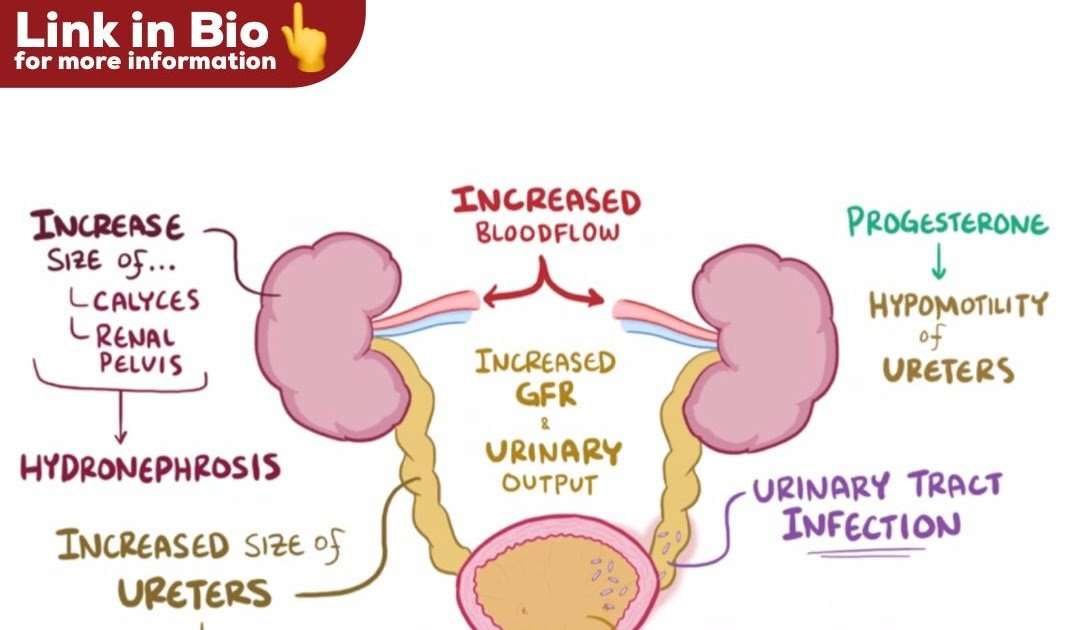What Causes Urinary Tract Infections
Urinary tract infections are most commonly caused by the bacteria Escherichia coli, which you might know as simply E. coli.
These bacteria are responsible for about 90% of all uncomplicated urinary tract infections. E. coli are found in the colons of humans and animals and in their fecal waste. When E. coli or other bacteria end up in the urethra, they cause a urinary tract infection.
There are other types of bacteria also known to cause UTIs. According to a study by The National Center for Biotechnology Information the most common bacteria to cause UTIs are:
- Escherichia coli
- Klebsiella pneumoniae
- Streptococcus spp. , Staphylococcus epidermidis, Pseudomonas aeruginosa, and Enterococci were each found to be the third pathogens in different periods during the two-year study.
When To See A Healthcare Provider
People will often assume that sudden flank pain is caused by a pulled muscle or overexertion, and, in many cases, it will be.
If the pain persists, worsens, or is accompanied by urinary symptoms or signs of infections, you should see your healthcare provider as soon as possible. This is especially true if you are experiencing high fever, chills, vomiting, or the inability to urinate.
Even if a kidney infection is mild, it can sometimes progress and lead to bacteremia if left untreated. This is a condition in which a local bacterial infection âspills overâ over into the bloodstream, causing systemic and potentially life-threatening symptoms, including irregular body temperatures, disruptions in breathing, a severe drop in blood pressure, and shock.
Given that acute pyelonephritis can strike in as little as two days, a rapid response is essential.
The same applies if you experience a dull but persistent pain alongside uncommon symptoms such as painful urination, chronic fatigue, or unexplained weight loss. None of these should be considered normal, and you shouldnât wait until there is visible blood in urine to seek care.
If you are pregnant, don’t assume that persistent back pain is pregnancy-related. Be cognizant if there is a dull ache across your lower back or along the sides of your back between the ribs and hips. If accompanied by symptoms of infection or changes in urination, call your healthcare provider immediately.
How Are Kidney Infections Diagnosed
Two common laboratory tests are performed to diagnose kidney infections . A urine sample is examined under a microscope to determine if white and/or red blood cells are present. The urine is also sent to the lab to see if bacteria grow in a urine culture. If a person is very sick, blood cultures may also be sent. The strain of bacteria that are cultured will determine the type of therapy used in your treatment.
Pyelonephritis can often be treated without X-ray studies, unless your doctor suspects there may be an addition problem. CT scans produce images of structures and organs and these scans are usually done without contrast . A renal ultrasound may sometimes suffice for evaluation.
Read Also: What Std Causes Kidney Pain
What Does A Kidney Infection Feel Like
Generally speaking, the symptoms of a kidney infection tend to come on over a period of several hours to a day. The symptoms may include:
- Pain. This is often a dull, aching type of pain that most commonly affects the back, side, or abdomen.
- Urine changes. If you have a kidney infection, you may notice that your urine is cloudy, smells bad, or contains blood.
- Urgent, painful urination. A UTI can irritate the lining of your urinary tract. As a result, you may feel the urgent need to urinate and experience a painful, burning sensation when you do so.
- Fever. People with a kidney infection typically develop a fever, which can often be high. A raised temperature is one of your bodys ways of trying to fight the infection.
- Chills.Chills are a feeling of being cold without any apparent cause. For example, you could be wrapped up under a blanket and still shiver or feel very cold. In extreme cases, chills may lead to episodes of strong, uncontrollable shaking, which are known as rigors.
- Nausea or vomiting. The infection may cause you to feel nauseated or to vomit.
Its important to note that you may not have all of the above symptoms with a kidney infection. If you develop concerning symptoms that may point to a kidney infection, seek prompt medical care.
What Are The Symptoms Of Kidney Infection

A number of symptoms can indicate to your doctor that you may have a kidney infection. The more severe the symptoms, the more likely the infection involves the kidney. Symptoms of a kidney infection include:
- Sudden onset of chills
If you experience any of these sudden onset symptoms, please seek medical attention.
Don’t Miss: Celery Juice Kidneys
Why Is It Called Omicron
Officials at the World Health Organisation skipped two letters of the Greek alphabet when naming the latest Covid variant in order to avoid “stigmatising” China, and perhaps its premier Xi Jinping.
A WHO source confirmed the letters Nu and Xi had been deliberately avoided. Nu had been skipped to avoid confusion with the word “new” and Xi had been ducked to “avoid stigmatising the region”, they said.
Since May, new variants of Sars-COV-2 have been given sequential names from the Greek alphabet under a naming convention devised by an expert committee at the WHO. The system was chosen to prevent variants becoming known by the names of the places where they were first detected, which can be stigmatising and discriminatory.
What Is The Outlook For Kidney Infections
With treatment, the outlook for kidney infections is very positive. It is vital that you take all of any prescribed medications for the infection. You may begin feeling better shortly after beginning a treatment, but still need to take the entire prescribed treatment.
Last reviewed by a Cleveland Clinic medical professional on 05/22/2019.
References
- National Kidney Foundation. Urinary Tract Infections Accessed 5/23/19.
- National Institute of Diabetes, Digestive and Kidney Diseases . Pyelonephritis: Kidney Infection Accessed 5/23/19.
Read Also: How To Tell If You Have Bad Kidneys
Symptoms Of Kidney Infection
Symptoms of pyelonephritis often begin suddenly with chills, fever, pain in the lower part of the back on either side, nausea, and vomiting.
, including frequent, painful urination. One or both kidneys may be enlarged and painful, and doctors may find tenderness in the small of the back on the affected side. Sometimes the muscles of the abdomen are tightly contracted. Irritation from the infection or the passing of a kidney stone can cause spasms of the ureters. If the ureters go into spasms, people may experience episodes of intense pain . In children, symptoms of a kidney infection Urinary Tract Infection in Children A urinary tract infection is a bacterial infection of the urinary bladder , the kidneys , or both. Urinary tract infections are caused by bacteria. Infants and younger… read more often are slight and more difficult to recognize. In older people, pyelonephritis may not cause any symptoms that seem to indicate a problem in the urinary tract. Instead, older people may have a decrease in mental function , fever, or an infection of the bloodstream .
In chronic pyelonephritis, the pain may be vague, and fever may come and go or not occur at all.
Medication Options For Kidney Infection
Your doctor will decide what antibiotic to prescribe, and for how long, based on your symptoms and the results of your urine tests. Your doctor may start you on one medication right away, but change it later if your urine test results indicate that a different antibiotic will be more effective.
Drugs taken by mouth for kidney infection include:
All of these drugs and others may be considered for IV treatment if you need to be hospitalized for a severe kidney infection.
You May Like: Kidney Eating Huntsman Spider
Can I Go To Work With A Kidney Infection
Most kidney infections are treated on an outpatient basis with oral antibiotics. Symptom relief typically occurs after a few days of treatment, so it may be possible to go to work at that point. Many patients, however, require a week or two before they feel well enough to work. As always, never go to work with a fever.
What Is A Kidney Infection Symptoms Causes Diagnosis Treatment And Prevention
A kidney infection, also known as pyelonephritis, occurs when harmful bacteria reach your kidneys as part of a urinary tract infection .
Most UTIs dont involve the kidneys. They affect only your lower urinary tract, meaning your urethra and bladder. But sometimes an infection that begins there moves into your upper urinary tract, affecting one or both kidneys.
Its also possible to get a kidney infection following surgery, if bacteria enter your body during the procedure and travel through your bloodstream to your kidneys. In this case, your lower urinary tract may not be affected.
If you have symptoms of a UTI or bladder infection such as pain with urination, smelly urine, low back pain, or discolored urine its important to seek medical treatment to prevent the infection from spreading to your kidneys.
Kidney infections can be quite painful and require prompt evaluation and treatment. If your infection isnt treated soon enough, it may permanently damage your kidneys or spread to your bloodstream, possibly leading to and the impairment of other vital organs.
Read Also: Watermelon Good For Kidneys
How Long Would The Symptoms Of Kidney Infection Last
Related questions
Found in:
People also asked
Kidney Infection Pain Lasts How Long

Ask U.S. doctors your own question and get educational, text answers â it’s anonymous and free!
Ask U.S. doctors your own question and get educational, text answers â it’s anonymous and free!
HealthTap doctors are based in the U.S., board certified, and available by text or video.
Similar questions
You May Like: Is Red Wine Good For Kidney Stones
Why Are Women More Likely To Get A Uti
The reason that women get urinary tract infections more often is due to their anatomy. Their urethras are much shorter than mens urethras, allowing the bacteria to reach the bladder easier. A womans urethra is also closer to her anus, making it easier for the bacteria to enter the urinary system.
Through improper wiping, sexual intercourse, and even toilet backsplash, E. coli can potentially end up in your urinary system.
Causes And Risk Factors Of A Kidney Infection
Kidney infections can be caused by bacteria or viruses that spread in your urinary tract, but bacterial infections are much more common.
In fact, about 90 percent of kidney infections are caused by a single type of bacteria, Eschericia coli, or E. coli, according to the Cleveland Clinic.
The infection is thought to occur from bacteria that travel from your gastrointestinal tract to your skin surface, through your urethra to your bladder, then through the tubes that connect your bladder and kidneys.
Normally, urine flushes any potentially harmful bacteria out of your ureters before they can cause an infection. But sometimes this doesnt happen due to the following conditions:
- Structural abnormalities in your ureters or kidneys
- Enlarged prostate
- Urine backflow from your bladder to your kidneys
Its also possible for bacteria from your bloodstream to enter your kidneys and cause an infection. This happens most commonly with staphylococcus, or staph, bacteria.
Kidney infections that spread from your bloodstream tend to develop after surgery or as a consequence of another infection elsewhere in the body. For example, if an artificial joint or heart valve becomes infected, the kidneys can become secondarily infected.
Its very uncommon for kidney surgery to lead to a kidney infection.
A number of factors can increase your risk of developing a kidney infection:
This reduced urine flow can make it easier for bacteria in your bladder to migrate into your kidneys.
Also Check: Is Watermelon Bad For Kidneys
Preventing Urinary Tract Infections And Kidney Infections
Urinary tract infections and kidney infections can generally be prevented through similar means.
If you suffer from any symptoms of a urinary tract or kidney infection, talk to your doctor immediately. The faster you act, the more effective the treatment.
If you experience any symptoms of urinary tract infection or kidney infection, call or book online with PlushCare to set up a phone or video appointment with a top U.S. doctor today.
Alternative And Complementary Therapies
There are no effective alternative or complementary methods or therapies for curing a kidney infection.
But there may be ways you can increase your comfort while being treated with antibiotics, such as placing a heating pad on your abdomen, back, or side to ease any pain in those areas.
Drinking plenty of fluids can also help flush the bacteria causing the infection from your system.
And getting plenty of rest will help in your recovery from the infection.
Don’t Miss: Can Kidney Stones Cause High Blood Sugar
Ok Got It But Then What Is A Kidney Infection
A kidney infection is, in essence, a UTI that has spread into the kidneys. While this type of infection is rare, its also very dangerous and if youre experiencing any of the following signs of a kidney infection, you should see a doctor immediately:
-
Upper back or side pain
-
Fever, shaking or chills
-
Feeling nauseous
-
Vomiting
While most kidney infections can be treated simply with an antibiotic, if left untreated, a kidney infection can cause damage to your kidneys, leading to chronic kidney disease. The bacteria could even spread to your bloodstream creating a life-threatening situation.
Kidney Infection Back Pain
Can kidney problems give you back pain? The main indicator of whether a urinary tract infection has migrated from the bladder to the kidneys is a fever and back pain. Kidney infections are serious and require immediate medical attention.
Therefore, its important to know the symptoms of a kidney infection so that you know when to seek treatment.
Recommended Reading: Is Watermelon Good For Kidney Patients
Questions To Ask Your Doctor
- Why do you think I got a kidney infection?
- How much water should I drink every day to stay hydrated?
- What is the best medicine for me to treat my kidney infection?
- Once I start medicine, how long will it take for my symptoms to go away?
- Since Ive had one kidney infection, am I likely to get another?
- What is the risk of a kidney infection leading to chronic kidney disease?
Can Kidney Infection Be Prevented

Most kidney infections are caused by germs travelling up from a bladder infection. So the same things that can help to reduce your chances of bladder infection should reduce your chances of kidney infection. Traditionally, people who got recurring urine infections were advised about measures such as drinking plenty of fluid and taking cranberry juice, and on the way that they wiped themselves after going to the toilet. However, there is little evidence for any of these measures and they are now not usually advised. Anything which increases your risk of urine infections which can be treated, should be treated. For example, any constipation should be treated promptly, as constipation can increase your chances of a bladder or kidney infection. See the separate leaflet called Constipation for more details. Doctors will try to treat anything else which might be contributing, such as kidney stones or an abnormality in the structure of the urinary system.
Pregnant women are regularly tested for urine infections and for germs in their urine. Even if they don’t have symptoms, if urine tests positive for germs, pregnant women are usually treated with antibiotics to prevent any complications.
In some cases people who have recurring urine infections are treated with a low dose of antibiotic continually. This may help to prevent recurrences and to prevent spread to the kidney.
Recommended Reading: Is Watermelon Kidney Friendly
Things You Can Try Yourself
If you have a kidney infection, try not to “hover” over the toilet seat when you go to the loo because it can result in your bladder not being fully emptied.
It’s also important for most people with a kidney infection to drink plenty of fluids because this will help to flush out the bacteria from your kidneys. Aim to drink enough so that you’re frequently passing pale-coloured urine.
If you have kidney failure, get advice from your doctor on how much to drink.
Make sure you get plenty of rest. A kidney infection can be physically draining, even if you’re normally healthy and strong. It may take up to 2 weeks before you’re fit enough to return to work.
Understanding Your Urinary Tract
Your urinary tract, or urinary system, comprises several different organs designed to extract, hold, and transport waste from your system in the form of urine. The main organs involved in the urinary system include:
- The kidneys: These two organs sit on each side of your body, generally around the waist. They filter out excess water and waste from your blood to create urine.
- The ureters: These two thin tubes run between the kidney and bladder, transporting urine to the bladder.
- The bladder: This organ stores urine until it reaches a certain level, at which point you feel the need to pee. The body voluntarily contracts the muscles that line the bladder to urinate.
- The urethra: This thin tube connects the bladder to the outside of the body. When you urinate, a muscle called the urinary sphincter relaxes as your bladder contracts to remove urine from your body.
Urinary tract infections happen when bacteria infect any part of your urinary system, but they are most common in your lower urinary tract, comprising the urethra and bladder.
Also Check: Soda And Kidney Stones